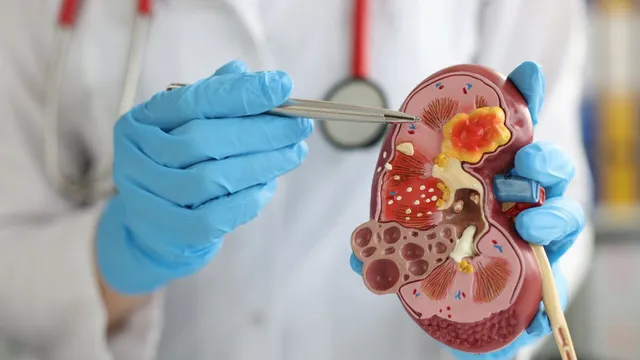- By Priyanka Munshi
- Fri, 20 Sep 2024 04:51 PM (IST)
- Source:JND
It is important to understand whether kidney stones can lead to cancer, especially for maintaining long-term health and recognizing potential risks. Kidney stones form when minerals and salts in the urine crystallize, causing discomfort, pain, and complications if not treated early. While there is no direct evidence that kidney stones themselves cause cancer, some types of kidney stones may increase the risk of certain kidney diseases or urinary tract complications, which could potentially lead to cancer over time.
Chronic inflammation and damage caused by recurrent kidney stones can create an environment for abnormal cell development in the kidneys or urinary system. People with a history of kidney stones may be at a higher risk of developing renal cell carcinoma, a type of kidney cancer. Therefore, it is essential to be aware of kidney stone prevention methods, available treatment options, and the long-term impact on kidney health.
To reduce the risk of kidney stones, it is advisable to drink plenty of water regularly, maintain a healthy and balanced diet, and consult a doctor if any symptoms arise, as early treatment is crucial in preventing kidney stones. In a conversation with Jagran English, Dr. Rajesh Kumar Reddy Adapala, a Consultant Uro-Oncologist at the Asian Institute of Uro-Oncology and Robotic Surgery in Hyderabad, discussed the question: Can kidney stones cause cancer?
"Kidney stones, in general, do not cause kidney cancer. Common risk factors for kidney cancer include tobacco consumption in any form. Kidney stones are typically formed inside the pelvicalyceal system, known as the urine drainage system, which is lined by a mucosal layer called the urothelium," Dr. Rajesh explained.
Also Read: Quickest Methods To Test For Mpox Infections; Know From Expert
According to Dr. Rajesh, if kidney stones are neglected, particularly larger stones with irregular contours, they can cause chronic irritation of the urothelium. This chronic irritation can eventually lead to cell mutations, resulting in cancer. The process is similar to a sharp tooth causing long-term irritation of the oral mucosa, which can lead to mouth cancer. However, this process may take decades to progress into full-fledged cancer.
This type of cancer, caused by kidney stones, is known as squamous cell carcinoma in medical terminology. It is a rare form of cancer, and its incidence is decreasing as more people seek medical attention for kidney stones. However, this cancer variant is very aggressive and can spread to other parts of the body if not treated in time. Another challenge is that squamous cell carcinoma often shows a poor response to chemotherapy or radiation. Detecting this cancer in its early stages is difficult, as it is usually silent during those stages. Therefore, it is crucial to consult a urologist and remove kidney stones to prevent cancerous degeneration, Dr. Rajesh added.
Also Read: Know About Importance Of Folic Acid During Pregnancy; Experts Share Valuable Insights
Dr. Rajesh also noted, "The reassuring thing is that small stones with smoother contours are not dangerous and do not typically cause cancer. Tiny stones are not harmful as long as they remain stable in size and do not obstruct the drainage of urine." However, he advised always consulting a urologist to make decisions on whether to observe or remove the stones. To reduce the risk of stone formation, it is important to stay hydrated, avoid beverages, limit oxalate-rich foods, salt, and red meat.

